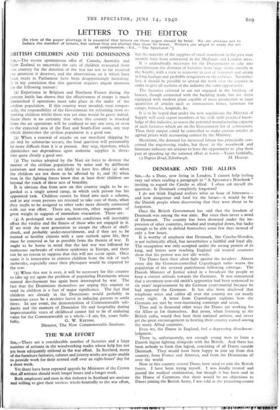LETTERS TO THE EDITOR [In view of the paper shortage
it is essential that letters on these pages should be brief. We are anxious not to reduce the number of letters, but unless they are shorter they must be fewer. Writers are urged to study the art of compression.—Ed., " The Spectator."1
BRITISH CHILDREN AND THE DOMINIONS
Slit,—The recent spontaneous offer of Canada, Australia and New Zealand to unnertake the care of children evacuated from this country for the duration of the war has not so far received the attention it deserves, and the observations on it which have beat made in Parliament have been disappointingly hesitating. It is my conviction that this question requires urgent attention for the following reasons : (i) Experience in Belgium and Northern France during the present battle has shown that the effectiveness of troops is much diminished if operations must take place in the midst of the civilian population. If this country were invaded, even tempor- arily, the responsibility of the Government for refraining from re- moving children whilst there was yet time would be grave indeed. Since there is no certainty that when this country is attacked from the air operations will be confined to any one area, or even to the expected area of the East and South-East coast, any step which diminishes the civilian population is a good one.
(2) When a renewal of attacks on our merchant shipping by air and by submarine occurs, the food question will presumably be more difficult than it is at present. Any step, therefore, which diminishes our dependence upon seaborne supplies is there- fore quite clearly a good one.
(3) The tactics adopted by the Nazi air force to destroy the morale of the civilian populations by noise and by deliberate terrorism and massacres are likely to have less effect (a) when the children are not there to be affected by it; and (b) when men in the fighting forces know that at least their children are beyond the reach of these acts of brutality.
It is obvious that from now on this country ought to be re- garded as a single armed camp, in which each person has his appointed task. Children cannot be fitted into such a scheme, and in any event persons are retained to take care of them, when they ought to be assigned to other tasks more directly connected with our war effort. There are, however, other arguments of great weight in support of immediate evacuation. These are: (4) A prolonged war under modern conditions will inevitably affect the vitality and the fitness of those who are engaged in it. If we wish .he next generation to escape the effects of shell- shock, and probably under-nourishment, and if they are to be trained as healthy citizens with a sane outlook upon life, they must be removed as far as possible from the theatre of war. It ought to be borne in mind that the last war was followed by numerous outbreaks of virulent epidemics in Europe, and there can be no reason to suppose that this will not occur again. Once again it is imperative to remove children from the risk of such outbreaks, especially since their physiques would be impaired by the war.
(5) When this war is over, it will be necessary for this country to take up yet again the problem of populating Dominions whose normal development has again been interrupted by war. The fact that the Dominions themselves are urging this country to send its children is a fact of major significance. The fact that children are already in the Dominions would probably in numerous cases be a decisive factor in inducing parents to settle there. In any event, the demonstration of Commonwealth soli- darity and the memory of Dominion life and hospitality during impressionable years of childhood cannot fail to be of enduring value for the Commonwealth as a whole.—I am, Sir, yours faith- Director, The New Commonwealth Institute.






























 Previous page
Previous page